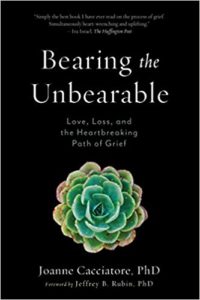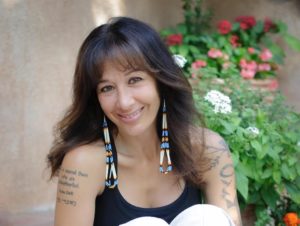Today SevenPonds concludes our interview with Dr. Joanne Cacciatore, Ph.D. a psychologist and educator who specialize in helping clients navigate the experience of traumatic grief, especially in the wake of the death of a child. The founder of the MISS Foundation, an international nonprofit which provides counseling, advocacy, research and education to bereaved families, she is a professor at Arizona State University and the author of several books, including the critically acclaimed “Bearing the Unbearable: Love, Loss and the Heartbreaking Path of Grief.” Dr. Cacciatore is also the founder of the Center for Loss and Trauma and the Selah House Care Farm and Respite Center in Sedona, Arizona. Perhaps most importantly, she is the mother of five children, “four who walk, and one who soars.”
Editor’s Note: This interview has been edited for length and clarity.

Credit: wisdompubs.org
Kathleen Clohessy: Why do you think our culture is so grief averse? Why is it that we cannot be fully present with our own or others’ grief?
Joanne Cacciatore: I believe our culture is very fearful of painful emotions. We are so caught up in the idea that life is all about the “pursuit of happiness” that we seek only pleasant experiences and “feel good” emotions. We are terrified of pain and suffering, and when we see it in others we want to “fix” it and make it go away. This is especially true when we are faced with an unthinkable tragedy like the death of a child.
Kathleen: But what drives this aversion? What’s wrong with us that we run away from suffering in this way?
Joanne: That’s a great question. Ernest Becker tackled it in his book, “Denial of Death” in which he posits that fear of death is what drives most human behavior. And I believe that extends to the fear of grief. When we are confronted with another person’s suffering, we’re forced to look at our own fear of loss. And it’s terrifying to consider that much pain. So we push it away. That’s one of the reasons I started the MISS foundation — to help educate and raise awareness about the need to provide ongoing support to those who have a lost a child in a compassionate, accepting, non-medicalized way.
Kathleen: How does the fear of grief affect us as human beings?
Joanne: When we cut ourselves off from negative emotions and what we perceive as negative experiences, we cut ourselves off from a part of ourselves. We become a contracted version of the people we are meant to be. Even as we’re working so hard to be “happy,” we’re separating ourselves from the full range of human experience, including the experience of deeply felt joy.
On the other hand, when we allow ourselves to fully inhabit our grief, our hearts break open, and we are able to open to the suffering of those around us. We connect to the entire universe in a completely different, much more authentic way.
 Kathleen: In your book, “Bearing the Unbearable” you talk about clients you’ve worked with who have lived with traumatic grief for many years. And many of them had gone to great lengths, psychologically and behaviorally, to escape their pain. Can you talk about that a little bit?
Kathleen: In your book, “Bearing the Unbearable” you talk about clients you’ve worked with who have lived with traumatic grief for many years. And many of them had gone to great lengths, psychologically and behaviorally, to escape their pain. Can you talk about that a little bit?
Joanne: Sure. When people come to me, they have very often been suffering terribly for a very long time because they have never been supported in a way that allows them to fully inhabit their grief. They’ve been told that it was time to “move on.” They’ve been told that their grief had gone on for too long; that is was time to “get over” their loss. Of course, this advice was impossible to follow, and it left them feeling alone and isolated at a time when what they most needed was connection and support.
Ultimately, many people in traumatic grief who don’t get the support they need turn to self-destructive behaviors to numb the pain. I had one aging client who had been engaging in multiple self-destructive behaviors for 46 years after the death of her child. Finally, she decided that she didn’t want to end her life the way she was living it, and she reached out to me for help.
Kathleen: What are your thoughts on the concept of “pathological” or “complicated” grief? Do you think there is a “typical” timeline for grief and when a person exceeds that time frame their grief becomes “abnormal”?
Joanne: No I don’t. Everything in life happens in context, including grief and loss. Going back to the example of a 90-year old woman who dies peacefully in her sleep versus being murdered in her bed, context matters. Saying that “normal” grief lasts six months to two years or that grieving longer than that is pathological ignores context completely. What were the circumstances of the loss? Was it a traumatic death? What was the person’s support system like? Those are just some of the contextual issues that impact a person’s experience with grief.
The psychiatric community has been trying to medicalize grief for a long time, and has recently assigned certain grief behaviors ICD and DSM codes. I see this as very unfair and unhelpful. Grief is not linear or acontextual. It is an individual experience, and everyone who grieves needs compassionate acceptance and ongoing support.
 Kathleen: What advice would you offer to someone who is suffering from traumatic grief or who knows someone who is suffering and wants to help?
Kathleen: What advice would you offer to someone who is suffering from traumatic grief or who knows someone who is suffering and wants to help?
Joanne: First, I would tell them to find a really good counselor. The MISS Foundation offers a certificate program in Compassionate Bereavement Care to providers and we provide a directory of certified professionals on our website. So I would recommend that anyone who needs help with traumatic grief start there.
I would also encourage them to seek out a “green care” provider, someone who integrates the concepts of care farming into their model of care. Encouraging the family to participate in counseling is also important, since traumatic grief involves the entire family unit, including siblings and grandparents.
Bibliotherapy can also be very helpful. Reading about the experiences of others helps people who are grieving realize that they are not alone and that their feelings are far from unusual or unique. Attending a grief retreat can have the same effect. It’s so beneficial for grieving people to connect to others who have suffered a traumatic loss. It creates a positive feedback loop of compassion and support.
Kathleen: What about the concept of “self care”? You talk about that quite a bit in your book too. Can you explain what that is and what it involves?
Joanne: Sure. Self care is “self compassion in action.” It’s about being kind to yourself and caring for yourself in a really conscious way: Being outside; taking walks; getting enough sleep; writing about your feelings; doing what you love to do…these are all examples of compassionate self care. For some more examples, take a look at Ideas for a Self-Care Strategy on my website JoanneCacciatore.com.
Kathleen: Joanne, I would love to talk with you for another few hours, but I think you’ve got other work to do. Thank you so much for taking the time to speak with me and sharing your knowledge with our readers. It’s been a pleasure!
Joanne: You’re very welcome.
Did you miss the first part of our interview with Dr. Cacciatore? If so, please catch up here.

 How Can We Open Our Hearts to Grief?
How Can We Open Our Hearts to Grief?


 First the Wealth Gap, Now the U.S. Has a Growing Health Gap
First the Wealth Gap, Now the U.S. Has a Growing Health Gap

 Our Annual Seven Holiday Gifts for Someone Who Is Grieving, 2024 Edition
Our Annual Seven Holiday Gifts for Someone Who Is Grieving, 2024 Edition














